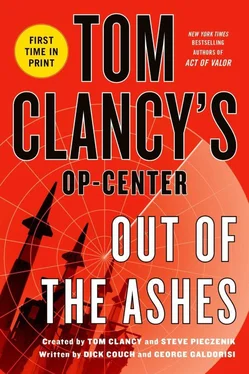“Give it to me straight, Trevor; I sense you still have reservations.”
“Mr. President, I’ve served in this town for a long time. As you know, I have considerable experience in national security matters from tours in the Pentagon, State, the National Security Council, and elsewhere. I was pretty well plugged into some of the missions the old Op-Center was called on to do.”
Harward paused to frame his next words carefully.
“When you recruited me, Mr. President, we agreed that due to the stakes involved, there had to be complete trust between us in all we did—”
“And we have had that in our time together, haven’t we?” Midkiff interrupted.
“Absolutely, Mr. President, and I’m honored by the trust you’ve placed in me. Yet I’m your national security advisor . At the end of the day, all I bring you is advice — well-reasoned and well-staffed advice — but advice nonetheless. In the final analysis, that’s all it is.”
“But Trevor, don’t minimize your importance to my administration.”
“I’m not, Mr. President, but I am most certainly motivated to protect you as well as advise you. Once you put Op-Center in motion, it will begin to do things I believe we both want done. When needed, you will likely give Chase Williams broad discretion and freedom of action. That authority will sometimes allow him to act first and inform you after the fact.”
“Well, yes, I think we agree on that.”
“Then that becomes the critical question. Do you, as president, trust Chase Williams with the broad discretion and freedom of action he needs to have as Op-Center director? Are you certain he will be thoughtful and discreet as he takes action? This is important, Mr. President, because without putting too fine a point on it, his actions could make or break your presidency.”
There was a long silence, and Harward could tell the president needed a moment to weigh the full import of what he had just told him. As for Midkiff, he was moved. As with all good politicians, he was inspired by the loyalty and selflessness of a hardworking subordinate.
“Trevor, first of all, thank you for that courageous and forthright analysis, and while I have never framed it the way you just did, I have indeed thought about this and thought about it deeply. I do trust the man. I trust him to do the right thing for our nation.”
“And for your presidency?” Harward asked.
Midkiff smiled. “Can the two be separated?”
“Then let’s move forward, Mr. President.”
* * *
The call between the secretary of defense and the commander of the United States Special Operations Command had been brief and to the point. It had not been preceded by the countless hours of staff work by each of the respective staffs that typically lead up to such calls between two senior national security principals.
The president had directed his SECDEF to deliver a measured, but firm, message to the SOCOM commander. Op-Center was being put back into operation and the new Op-Center director needed one of SOCOM’s JSOC teams under his exclusive operational control. The secretary of defense told him the Op-Center director would visit him at SOCOM headquarters in Tampa within the week and that the president expected him to have a JSOC team ready to second to Op-Center by then.
* * *
Armed with his mandate from the president, Chase Williams sat at his desk in the Eisenhower Executive Office Building with an Excel spreadsheet in front of him.
In the six weeks since the initial meeting with the president, Williams had worked nearly around the clock. In addition to developing an operational blueprint for Op-Center, he had been working on a short list of the talent he would need for the new organization.
He had promised the president he would have a skeleton organization up and running in three months. He had some phone calls to make.
Central Command, Commander’s Office, MacDill Air Force Base, Tampa, Florida
(January 19, 1400 Eastern Standard Time)
“Would you like some more coffee, Admiral?”
“Thank you, but I’m just fine.”
Chase Williams had been waiting in the outer office of the Commander, United States Special Operations Command for just under twenty minutes. It was unacceptable by any standard, but the SOCOM commander was making a point. So be it, Williams thought. I’ve certainly come down here to make mine. After a few more minutes, the attractive and aloof gatekeeper lifted the receiver. She listened for a few seconds and then replaced it.
“The commander will see you now.”
Williams rose and made his way into the general’s office. He stepped inside just as General Mark Patrick eased himself from his chair and walked around the desk to greet him.
“Admiral Williams, sorry to keep you waiting. Welcome and please have a seat.” He returned to his desk and picked up the phone. “Tracy, please hold all calls with the exception of the Southern Command commander. I’ll speak with him.” He glanced over at Williams. “That’s a call I have to take.” He replaced the receiver and took a seat, seemingly to now afford his guest his full attention. “Now, Admiral, what can I do for you — oh, and can I get you some more coffee?”
Williams leveled his gaze at the SOCOM commander for a full twenty seconds before he replied. “First of all, General, I’ve had quite enough coffee. Secondly, you may call me Mr. Williams. Unlike you, I’m no longer on active duty, and it’s a title I relinquished when I left active service. Thirdly, when this meeting was scheduled, I asked that your Joint Special Operations Command commander be present. I see he’s not here.” Patrick moved to speak, but Williams forestalled him with a raised hand. “And finally, you know exactly why I’m here. I sent you a service support request that was explicit and detailed, both in the force composition and the command relationships that will govern my operational control of these assets. Are you telling me you don’t have that request or are not prepared to discuss it?”
“Well, Admiral, or Mr. Williams, if you prefer, this is highly irregular. My JSOC commander had a previous engagement, so I took the liberty of excusing him from this meeting. As for the transfer of operational control of SOCOM and JSOC assets to you that’s, ah, well, I’m not sure that’s advisable, or if it’s even legal.”
This time, Williams waited even longer before speaking. When he did, he seemed to soften. “General, I’ve been a type commander and a geographic combatant commander — twice. So I can understand the parochial and even the personal issues that go with releasing your people to the authority of someone else who intends to put them in harm’s way. And I have great respect for your position and your time; that’s why I sent that request, which is nothing short of a formal operational tasker, to you personally. Also, General, I didn’t summon you to Washington; I came to you.”
Williams leaned in toward Patrick and hardened his tone. “As a direct representative of the president and in keeping with current executive practice that is well within the guidelines of congressional oversight, I think you know I’m on firm legal ground. As for the ‘advisability’ you referred to, that is noted, and with due respect, it’s above your pay grade. Now, per the request you’ve had for a week and that I know you’ve read thoroughly, I want a full troop of JSOC commandos put solely under my direction with the orders and authorization to train and act exclusively at my discretion. I will want those designated assets at the 160th Special Operations Aviation Squadron and the 1st Special Operations Wing also fenced so they come under my authority and mine alone.” There was another long pause while the two men stared at each other. “Now, I understand this is an unusual request, but when you give it consideration, it’s not unlike the arrangements you have with the geographic combatant commanders and your theater special operations commanders. You send them assets, you support those assets in theater, and they, not you, employ them in accordance with standing theater guidelines and host-nation agreements. With the exception of stateside training authority, I’m simply another end user.”
Читать дальше












